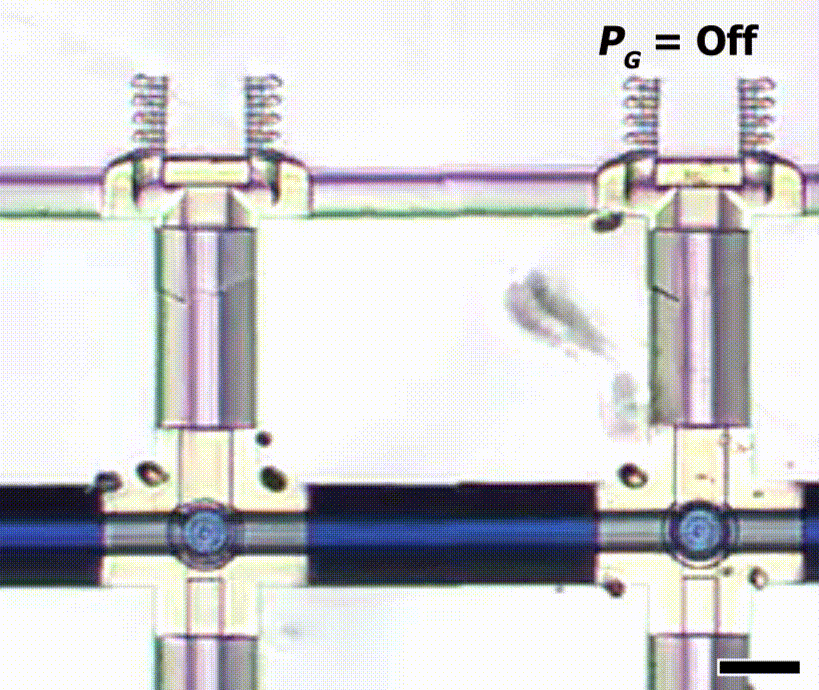|
The Institute of Physics (IOP) Journal of Micromechanics and Microengineering (JMM) recently honored Mechanical Engineering Assistant Professor Ryan D. Sochol as an “Emerging Leader” in the field.
The accolade follows a number of recent awards for Sochol and his “Bioinspired Advanced Manufacturing (BAM) Laboratory”, including the “Outstanding Paper Award” at this year’s Institute of Electrical and Electronics Engineers International Micro Electro Mechanical Systems Conference (IEEE MEMS 2021), the National Science Foundation (NSF) CAREER Award in 2020 and the “Outstanding Paper Award” at IEEE MEMS 2019.
Each year, the Editorial Board of JMM identifies a select number of the most highly recognized scientists in the early years of their research careers. These scientists are invited to submit an original research article for the JMM Emerging Leaders Special Issue, which includes topics such as MEMS, micro/nanofluidics, lab-on-a-chip and biomedical devices.
For their JMM Emerging Leaders Special Issue research article, Sochol and his team of engineers at UMD’s A. James Clark School of Engineering have 3D nanoprinted soft, microrobotic grippers—smaller than the thickness of a human hair—integrated with novel “normally closed” 3D microfluidic transistors.
“Robots are often thought of as metal systems with electronics, yet there is growing interest in a relatively new field called ‘soft robotics’ that is based instead on flexible systems controlled using fluidic means,” explained recent Ph.D. graduate and first author of the study, Dr. Abdullah Alsharhan. “In particular, soft microrobotic grippers offer unique benefits for biomedical applications such as tissue biopsies, drug delivery and microsurgery.”
Alsharhan previously presented their initial results as an oral presentation at IEEE MEMS 2020 in Vancouver, Canada.
 “One key challenge lies in finding ways to control the fluids that inflate, and in turn, activate the soft microgrippers,” said co-author Olivia Young, a first-year mechanical engineering Ph.D. student and Clark Doctoral Fellow. “So we explored the idea of controlling soft microrobotic systems using a new class of 3D nanoprinted microfluidic transistors that function similar to electronic transistors, but with fluids instead of electricity.” “One key challenge lies in finding ways to control the fluids that inflate, and in turn, activate the soft microgrippers,” said co-author Olivia Young, a first-year mechanical engineering Ph.D. student and Clark Doctoral Fellow. “So we explored the idea of controlling soft microrobotic systems using a new class of 3D nanoprinted microfluidic transistors that function similar to electronic transistors, but with fluids instead of electricity.”
“What we found to be special about our microfluidic transistors was that, by changing a simple geometric design like the diameter of a sealing disc, which is easy to do using our 3D nanoprinting approach, we were able to control their activation properties,” added co-author Xin “Pannie” Xu, a first-year bioengineering Ph.D. student.
“As a result, we were able to use 3D nanoprinting to build an integrated system in which identical sets of soft microgrippers would open or close under completely different conditions despite using just one control pressure,” said study co-author and recent mechanical engineering graduate, Anthony J. Stair, who participated in the research during his undergraduate studies.
At present, the team is leveraging their 3D nanoprinting-based technologies in next-generation military systems for U.S. national defense applications in collaboration with the U.S. Army Research Laboratory (ARL). In addition, they are also working to incorporate the microfluidic transistors into a state-of-the-art multi-material 3D nanoprinter.
“Challenges associated with fluidic control capabilities remain a significant impediment to the utility of emerging soft robots,” said Sochol, “But just as electronic integrated circuits (ICs) revolutionized conventional robotics fields, we envision that advances in 3D printing-enabled integrated fluidic circuitry could do the same for soft robotics.”
Journal Reference:
Abdullah T. Alsharhan, Olivia M. Young, Xin Xu, Anthony J. Stair and Ryan D. Sochol. Integrated 3D Printed Microfluidic Circuitry and Soft Microrobotic Actuators via In Situ Direct Laser Writing. Journal of Micromechanics and Microengineering, 2021; 31 (4): 044001 DOI: 10.1088/1361-6439/abec1c
This research was supported in part by U.S. NSF Awards 1943356 and 1761395 as well as U.S. ARL Award Number W911NF2020222.
Related Articles:
Acevedo Wins Outstanding Student Paper Award at IEEE MEMS Conference for 3D Nanoprinting Breakthrough
Collaborative international projects funded in solar power, cell-based systems, and ultra-low power systems
Miao Yu to develop cost-effective sensor for measuring lake health
Sarker Is Runner-Up for Springer Nature Best Paper Award
Das publishes work on microfluidic bacterial biofilm streamer formation in Scientific Reports
Recent Clark School Graduate Featured in Lab on a Chip
Teng Li Appointed Lead Guest Editor
March 2, 2021
|

